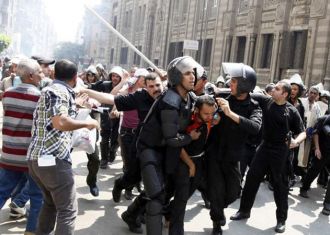More clashes in Cairo as political crisis drags on

Supporters and opponents of ousted Egyptian President Mohamed Morsi battled in downtown Cairo’s streets on Tuesday, hurling rocks at each other as police fired volleys of tear gas.
The violence erupted as a proposal by al-Azhar, Egypt’s leading religious authority, to bring together adversaries in the political crisis appeared to inch forward.
Morsi’s Muslim Brotherhood said it was ready take part in talks as long as they were on the right terms.
But the clashes showed the country was still dangerously divided six weeks after the army overthrew Morsi.
Brotherhood protest camps at Cairo’s al-Nahda Square and around Rabaa al-Adawiya mosque are the immediate focus of the crisis. Morsi supporters stood their ground behind barricades on Tuesday while Egypt’s interim leaders debated how to end their sit-in.
No police crackdown appeared imminent despite frequent warnings from the army-installed government that the protesters should pack up and leave peacefully.
But clashes broke out in central Cairo when a few thousand Morsi supporters marched to the Interior Ministry.
Pro-army residents and shop-workers taunted them, calling them terrorists and saying they were not welcome. They then threw stones at the marchers, getting showered back in return.
Some hurled bottles at the Morsi supporters from balconies. Police then fired tear gas at the demonstrators. Women and children marchers fled the scene in panic.
The clashes spread to several streets and brought Cairo traffic to a standstill.
“There’s no going forward with negotiations, the only way is back. Morsi must be reinstated,” said Karim Ahmed, a student in a blue hard-hat who waved a picture of Morsi as he flung rocks at a ministry building.
Morsi took office in June 2012 as Egypt’s first freely elected leader following the overthrow of long-ruling strongman Hosni Mubarak in a popular uprising the previous year.
But he failed to get to grips with a deep economic malaise and worried many Egyptians with apparent efforts to tighten Islamist rule of the most populous Arab nation.
The army ousted him amid huge demonstrations against his rule. Morsi and other Brotherhood leaders are now in jail.
Foreign mediators say the Brotherhood must accept that Morsi will not be reinstated. At the same time, the authorities must bring the Brotherhood back into the political process, they say.
The Brotherhood and the Salafi Nour party, Egypt’s second largest Islamist party, both suggested on Tuesday they would be willing to join a meeting called by al-Azhar, whose initiative is the only known effort to end the crisis peacefully following the collapse of international mediation last week.
“If they stick to the rules we’re asking for, yes,” Brotherhood spokesman Gehad el-Haddad said, adding that talks must be based on the “restoration of constitutional legitimacy”.
The Brotherhood would oppose proposals made by al-Azhar’s Grand Sheikh Ahmed el-Tayeb, because he had supported the army’s overthrow of Morsi, Haddad said. But he said there had been contacts with other al-Azhar officials.
Nour Party head Younes Makhyoun said his party had been invited to the al-Azhar talks.
“Currently the noble al-Azhar is trying to bring together for discussions those who have drawn up initiatives to agree, for example, on one initiative and vision, which we will use to pressure all the parties, so they accept it,” he told Reuters.
The effort, however, was being complicated by the friction between the Brotherhood and al-Azhar, he said.
The government has its own plan for elections in nine months, but for now it is wrestling with the difficult issue of how to tackle the protest camps.







